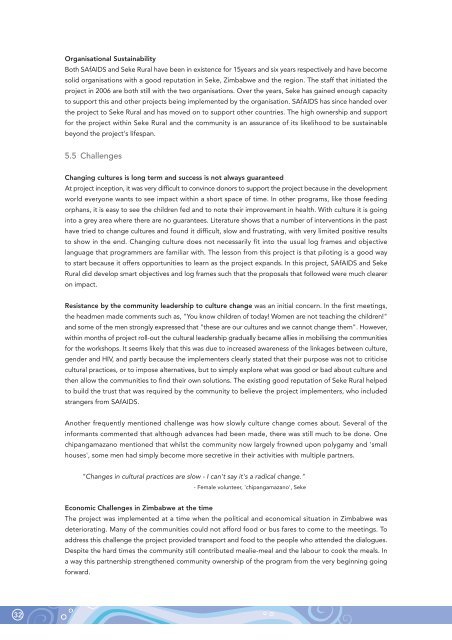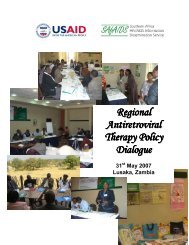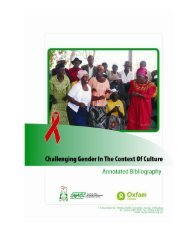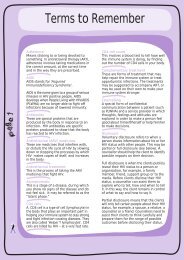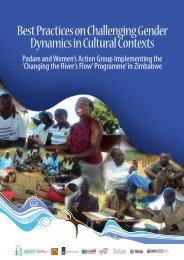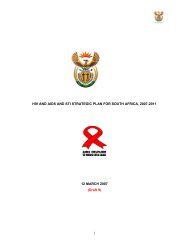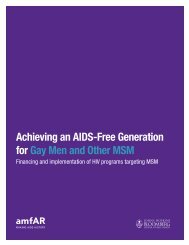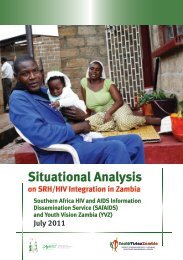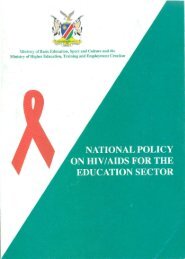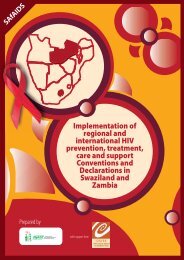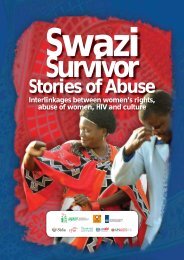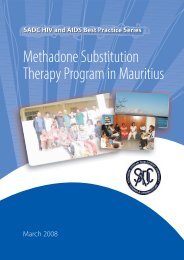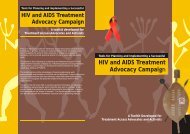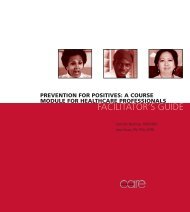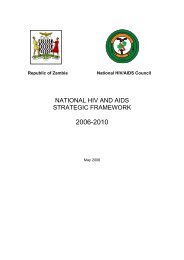Zimbabwean stories of "Best Practice" - SAfAIDS
Zimbabwean stories of "Best Practice" - SAfAIDS
Zimbabwean stories of "Best Practice" - SAfAIDS
Create successful ePaper yourself
Turn your PDF publications into a flip-book with our unique Google optimized e-Paper software.
Organisational SustainabilityBoth <strong>SAfAIDS</strong> and Seke Rural have been in existence for 15years and six years respectively and have becomesolid organisations with a good reputation in Seke, Zimbabwe and the region. The staff that initiated theproject in 2006 are both still with the two organisations. Over the years, Seke has gained enough capacityto support this and other projects being implemented by the organisation. <strong>SAfAIDS</strong> has since handed overthe project to Seke Rural and has moved on to support other countries. The high ownership and supportfor the project within Seke Rural and the community is an assurance <strong>of</strong> its likelihood to be sustainablebeyond the project's lifespan.5.5 ChallengesChanging cultures is long term and success is not always guaranteedAt project inception, it was very difficult to convince donors to support the project because in the developmentworld everyone wants to see impact within a short space <strong>of</strong> time. In other programs, like those feedingorphans, it is easy to see the children fed and to note their improvement in health. With culture it is goinginto a grey area where there are no guarantees. Literature shows that a number <strong>of</strong> interventions in the pasthave tried to change cultures and found it difficult, slow and frustrating, with very limited positive resultsto show in the end. Changing culture does not necessarily fit into the usual log frames and objectivelanguage that programmers are familiar with. The lesson from this project is that piloting is a good wayto start because it <strong>of</strong>fers opportunities to learn as the project expands. In this project, <strong>SAfAIDS</strong> and SekeRural did develop smart objectives and log frames such that the proposals that followed were much cleareron impact.Resistance by the community leadership to culture change was an initial concern. In the first meetings,the headmen made comments such as, "You know children <strong>of</strong> today! Women are not teaching the children!"and some <strong>of</strong> the men strongly expressed that "these are our cultures and we cannot change them". However,within months <strong>of</strong> project roll-out the cultural leadership gradually became allies in mobilising the communitiesfor the workshops. It seems likely that this was due to increased awareness <strong>of</strong> the linkages between culture,gender and HIV, and partly because the implementers clearly stated that their purpose was not to criticisecultural practices, or to impose alternatives, but to simply explore what was good or bad about culture andthen allow the communities to find their own solutions. The existing good reputation <strong>of</strong> Seke Rural helpedto build the trust that was required by the community to believe the project implementers, who includedstrangers from <strong>SAfAIDS</strong>.Another frequently mentioned challenge was how slowly culture change comes about. Several <strong>of</strong> theinformants commented that although advances had been made, there was still much to be done. Onechipangamazano mentioned that whilst the community now largely frowned upon polygamy and 'smallhouses', some men had simply become more secretive in their activities with multiple partners."Changes in cultural practices are slow - I can't say it's a radical change."- Female volunteer, 'chipangamazano', SekeEconomic Challenges in Zimbabwe at the timeThe project was implemented at a time when the political and economical situation in Zimbabwe wasdeteriorating. Many <strong>of</strong> the communities could not afford food or bus fares to come to the meetings. Toaddress this challenge the project provided transport and food to the people who attended the dialogues.Despite the hard times the community still contributed mealie-meal and the labour to cook the meals. Ina way this partnership strengthened community ownership <strong>of</strong> the program from the very beginning goingforward.32


